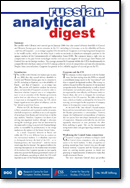Russia and the Arab Revolutions

Author(s): Roland Dannreuther
Editor(s): Stephen Aris, Matthias Neumann, Robert Orttung, Jeronim Perovic, Heiko Pleines, Hans-Henning Schröder, Aglaya Snetkov
Series: Russian Analytical Digest (RAD)
Issue: 98
Pages: 2-4
Publisher(s): Center for Security Studies (CSS), ETH Zurich; Research Centre for East European Studies, University of Bremen; Institute of History, University of Basel
Publication Year: 2011
